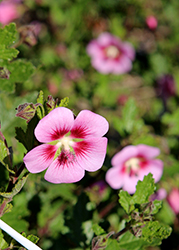Fri & Sat 8am - 8pm
Sun 8am - 7pm
Anytown, USA 12345
fax: 261.787.0463
e-mail: info@successgc.com


Plant Finder

Tara's Pink Cape Mallow
Anisodontea 'Tara's Pink'
Height: 8 feet
Spread: 6 feet
Sunlight:
![]()
![]()
Hardiness Zone: 9a
Other Names: African Mallow
Brand: San Marcos Growers
Description:
A garden origin hybrid that is a well branched, upright, evergreen shrub; large flowers are rose pink with red centers, and are produced year round; very drought tolerant and good for xeriscaping; plant in full sun or bright shade
Ornamental Features
Tara's Pink Cape Mallow features showy rose cup-shaped flowers with creamy white eyes and red centers along the branches from mid winter to late fall. It has dark green evergreen foliage. The lobed leaves remain dark green throughout the winter.
Landscape Attributes
Tara's Pink Cape Mallow is an open multi-stemmed evergreen shrub with an upright spreading habit of growth. Its average texture blends into the landscape, but can be balanced by one or two finer or coarser trees or shrubs for an effective composition.
This is a relatively low maintenance shrub, and is best pruned in late winter once the threat of extreme cold has passed. It is a good choice for attracting bees and butterflies to your yard. It has no significant negative characteristics.
Tara's Pink Cape Mallow is recommended for the following landscape applications;
- Accent
- Mass Planting
- Rock/Alpine Gardens
- General Garden Use
Planting & Growing
Tara's Pink Cape Mallow will grow to be about 8 feet tall at maturity, with a spread of 6 feet. It has a low canopy, and is suitable for planting under power lines. It grows at a medium rate, and under ideal conditions can be expected to live for 40 years or more.
This shrub does best in full sun to partial shade. It prefers to grow in average to dry locations, and dislikes excessive moisture. It is considered to be drought-tolerant, and thus makes an ideal choice for xeriscaping or the moisture-conserving landscape. This plant will benefit from an application of bonemeal and/or mycorrhizal fertilizer at the time of planting. It is not particular as to soil type or pH. It is somewhat tolerant of urban pollution, and will benefit from being planted in a relatively sheltered location. This particular variety is an interspecific hybrid.
